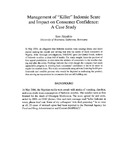| dc.contributor.author | Akpabio, E. | |
| dc.date.accessioned | 2010-02-24T13:12:19Z | |
| dc.date.available | 2010-02-24T13:12:19Z | |
| dc.date.issued | 2008 | |
| dc.identifier.citation | Akpabio, E. (2008) Managenent of "killer" indomie scare and impact on consumer confidence: a case study, International Journal of Strategic Communication, Vol. 2, pp 244-252 | en_US |
| dc.identifier.issn | 1553-1198 | |
| dc.identifier.uri | http://hdl.handle.net/10311/468 | |
| dc.description.abstract | In May 2004, an allegation that indomie noodles were causing illness and death started making the rounds and driving fear into the minds of loyal consumers in Nigeria. After thorough investigations, NAFDAC gave De-United Foods, makers of indomie noodles, a clean bill of health. The study sought, from the purview of fear appeal postulation, to determine the attitude of consumers to the noodles during and after the crisis. Findings indicate that even though the company had made appreciable progress in winning back consumers' confidence it has to do more to regain lost market share. The study recommends using adverts featuring health professionals and credible persons who would be depicted as endorsing the product, thus serving as reassurances to consumers that are still holding out. | en_US |
| dc.language.iso | en | en_US |
| dc.publisher | Routledge (Taylor and Francis), http://www.tandf.co.uk/journals | en_US |
| dc.subject | Management | en_US |
| dc.subject | Killer indomie scare | en_US |
| dc.subject | Consumer confidence | en_US |
| dc.title | Management of "killer" indomie scare and impact on consumer confidence: a case study | en_US |
| dc.type | Published Article | en_US |

